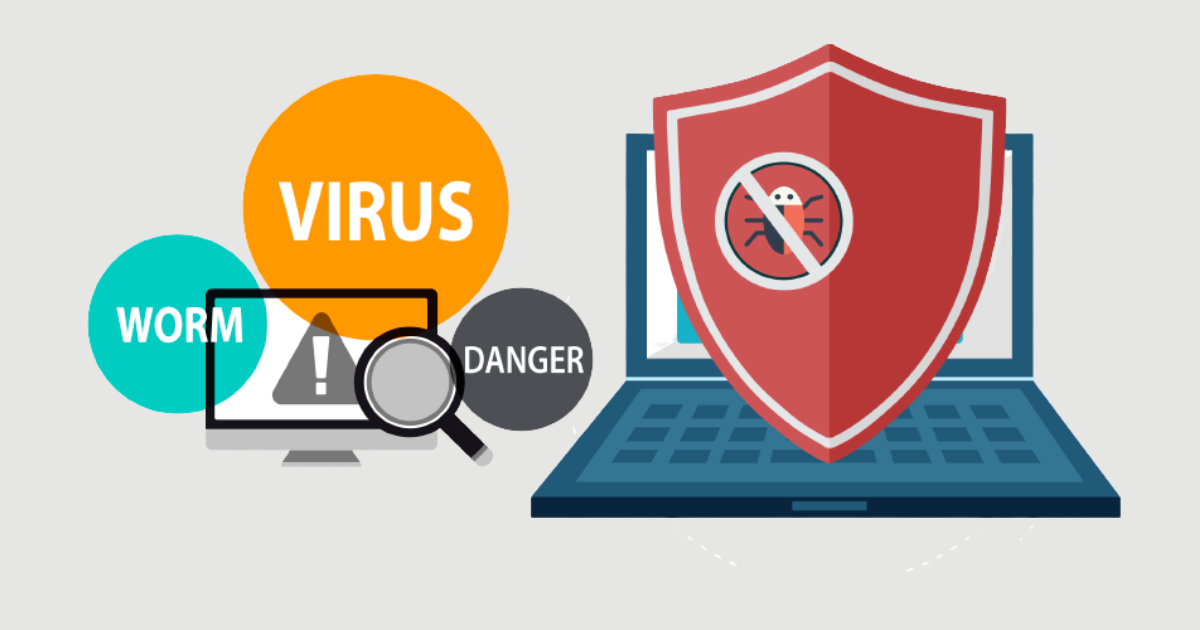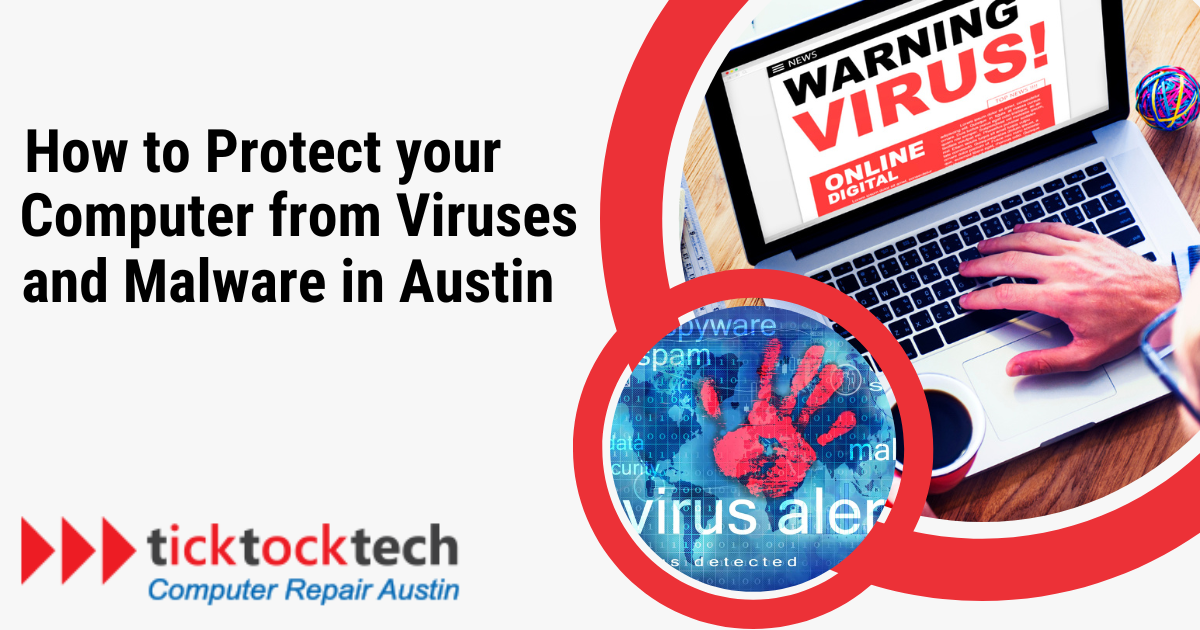As reliable as we think our computers are, they are susceptible to viruses and malware. These viruses can corrupt your files and compromise your personal information, including sensitive data like banking details and social security information. In this article, we will discuss how you can protect your computer from viruses. Let’s get started.
7 Ways to Protect Your Computer from Viruses and Malware in Austin

Below are our top 7 tips on how to protect your computer from viruses and malware. These cybersecurity best practices have worked to safeguard many computers, and we’re sure they will work for your PC too.
1. Keep your Software up to date
One of the most critical measures to effectively protect your computer from viruses and malware is to prioritize keeping your software up to date. Software manufacturers often release updates to address bugs and vulnerabilities that could potentially be exploited by hackers. It is crucial to stay well-informed about these software updates and only install updates from the official websites of the software manufacturers. It is recommended to configure your system to receive notifications or set updates to download and install automatically. Even if automatic updates are enabled, it is advisable to periodically check for updates manually to ensure that your computer is up to date.
2. Install an Antivirus
Whether you’re always connected to the internet or not, reliable protection is essential for your computer. Antivirus programs are worthy because they provide added layers of security to computers. With numerous antivirus programs available, it can be challenging to choose the best one for your needs. Prices may vary depending on the level of security offered. In some cases, it may be beneficial to install multiple antivirus programs that cover different aspects of security for comprehensive protection. While some might argue that antivirus software is unnecessary if you don’t access the internet from your PC, it’s important to recognize that viruses can be transmitted through other means, such as infected storage devices. Therefore, it’s crucial to understand that ensuring the safety and security of your computer goes beyond just internet connectivity.
3. Regular Backups
Backing up your important files and documents is essential to protect them from unfortunate events. There are three main options for storing your backup: external hard drives, online storage, and cloud storage.
- External hard drives: External hard drives provide a physical backup solution to store your data locally. External hard drives are a good option if you need to access your files offline or have a lot of data to back up.
- Online storage: Online storage, on the other hand, involves uploading your files to a remote server, offering accessibility from any device with an internet connection. Online storage is a great way to protect your files from physical damage.
- Cloud storage: Cloud storage is a method of storing computer data where digital information is stored on servers located off-site. In cloud storage, servers are managed and maintained by a third-party provider responsible for hosting, securing, and managing the data stored on their infrastructure.
Without a backup in place, recovering lost data becomes nearly impossible. This becomes even more critical considering the potential for accidental corruption of hard drives, which can result in permanent file loss.
4. Strong Passwords
A strong and secure password is a crucial way to protect your computer from viruses and malware. Passwords should be complex, combining uppercase and lowercase letters, numbers, and symbols. When creating a password, aim for a minimum length of eight characters or more. To make passwords easier to remember, use short phrases separated by spaces or underscore marks. Also, avoid using the same password for all your accounts to minimize the risk of unauthorized access.
5. Avoid Suspicious Links
Links, particularly those originating from unknown sources, can harm your PC. One prevalent tactic used by hackers is sending phishing emails that contain links leading to malicious websites. These malicious websites often extract sensitive data from users. It is essential to be vigilant and exercise caution when encountering unfamiliar links. Avoid clicking on links in emails, messages, or websites that appear suspicious or come from untrustworthy sources.
6. Use a firewall
Firewalls act as a barrier between your computer and external networks. They provide an additional layer of defense by blocking unauthorized access and potentially harmful connections from reaching your computer system. For the optimal effectiveness of your firewall, it is important to verify that it is enabled and properly configured. Ensure your computer’s settings or security preferences to confirm that the firewall is activated. Additionally, it is essential to keep your firewall software up to date. Regularly updating your firewall software ensures that you benefit from the latest security enhancements and bug fixes, maximizing its protective capabilities.
7. Security awareness training
Invest in a cyber training program for your workforce if necessary. Encourage a culture of cybersecurity awareness and vigilance among your workforce. Also, regularly communicate updates and reminders about emerging threats and security practices. By teaching your employees or colleagues these practices, they become an integral part of your network security solution rather than a potential risk factor.
Frequently Asked Questions
You can protect your computer against viruses by keeping your software up to date, installing an antivirus, backing up your files regularly, using strong passwords, avoiding suspicious links, and using a firewall.
You can protect your computer against viruses by installing an antivirus program. Different antivirus programs exist depending on your needs and budget.
Conclusion: How to Protect Your Computer from Viruses and Malware in Austin
Keeping your computer free from viruses and malware is not a difficult task. By practicing cautious browsing habits and staying vigilant for potential threats, you can ensure a safe computing experience. However, it is always beneficial to have an antivirus program installed as an additional layer of protection in case of emergencies. If you suspect you have an infected computer or you simply want to learn more about protecting your computer or network, we are here to assist you. Contact us to explore how you can adopt a proactive approach to viruses and other security threats.

